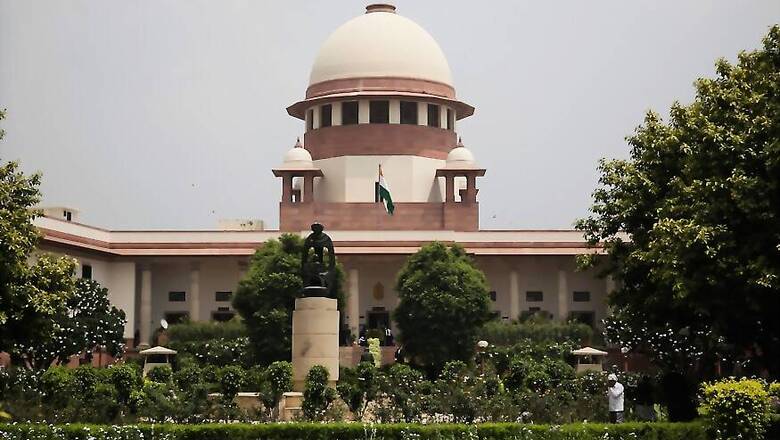
views
New Delhi: The Centre on Friday told the Supreme Court that its order allowing agencies to intercept, monitor and decrypt computer systems of the citizens was passed keeping in mind "legitimate state interest" and threats like "terrorism" and it did not violate the right to privacy.
The Ministry of Home Affairs (MHA), in its affidavit filed with the apex court registry, sought dismissal of the PILs challenging its December 20, 2018 notification authorising 10 central agencies to intercept, monitor and decrypt computer systems saying that these would be done by "an authorised agency".
"The grave threats to the country from terrorism, radicalisation, cross border terrorism, cyber crime, organised crime, drug cartels cannot be understated or ignored and a strong and robust mechanism for timely and speedy collection of actionable intelligence including signal intelligence, is imperative to counter threats to national security.
"This is undeniably legitimate state interest. It is therefore imperative that the request for lawful interception or monitoring must be dealt with by the executive authority to maintain speed and promptitude in taking decisions," the MHA said defending its order.
The apex court, which on January 14 had issued notice to the Centre on PILs, could not hear them on Friday as the Chief Justice of India (CJI) Ranjan Gogoi was unavailable due to sudden demise of his relative and Delhi HC judge Justice Valkimi Mehta.
"There is no blanket permission to any agency for interception or monitoring or decryption as the authorised agencies still require permission of the Union Home Secretary in each case as per due process of law and justification for interception or monitoring or decryption," Satinder Bhalla, Director in MHA, said in the affidavit.
The Centre said the use of the power to intercept, contemplated under the law, has brought several results in larger national interest in preventing terrorism, drug trafficking and intercepting and busting narcotic drugs racket.
"What has been done under the December 20, 2018, order was in fact restricting the exercise of powers, removing a possible vagueness and specifying the agencies/organisations who only would have the powers to utilise the powers of section 69 of the Information Technology Act," the Centre said.
It said the question as to which government agency can be authorised to exercise the power under the IT Act was never defined till December 20, 2018 and now, only 10 agencies have been authorised to exercise powers which are subject to approval of the competent authority.
"Considering the nature of the agencies specified in the order, the order not only streamlines but restricts the use of the Act and confines it to the cases of legitimate state interest," it said.
The order was intended "to prevent unauthorised use of these powers by any agency, individual or intermediary and to ensure that right to privacy of law abiding citizens is not violated by any agency, intermediary or person", it said.
The Centre said records pertaining to directions for interception and of the intercepted messages would be destroyed every six months unless they were required.
It said the 10 agencies have been asked to seek prior approval of the Union Home Secretary in each case of "interception or monitoring or decryption".
Such interception should be "restricted strictly for the purposes in the interests of the sovereignty or integrity of India, defence of India, security of the state, friendly relations with foreign states or public order, or for preventing incitement to the commission of any cognisable offence relating to above or for investigation of any offence", it said.
It has been emphasised to the agencies concerned that strict adherence to legal provisions must be ensured and every such case of interception is placed before the Review Committee to review such cases, it said.
It stated that review committees, comprising top officials, would be set up by the Centre and states to scrutiny such interceptions.
When the committee was of the opinion that the directions were not in accordance with the law, it may set aside the directions and order for destruction of the copies of the intercepted message or class of messages.
On the privacy, it said though the right to privacy was held to be a fundamental right, the veil of privacy can be lifted for the "legitimate state interest". "Use of power of interception contemplated under the law has brought several results in larger national interest in preventing terrorism, drug trafficking and interception and busting narcotic drugs racket," it said.
The court was hearing petitions, including those filed by advocates Manohar Lal Sharma, Amit Sahni and TMC MLA Mohua Moitra challenging the notification.
According to the government notification, 10 central probe and snoop agencies are now empowered under the Information Technology (IT) Act for computer interception and analysis, Home Ministry officials had said.
The 10 agencies notified under the order are Intelligence Bureau, Narcotics Control Bureau, Enforcement Directorate, Central Board of Direct Taxes (Income Tax Department), Directorate of Revenue Intelligence, CBI, NIA, Research and Analysis Wing, Directorate of Signal Intelligence (in service areas of J-K, North East and Assam) and Delhi Police commissioner.

















Comments
0 comment